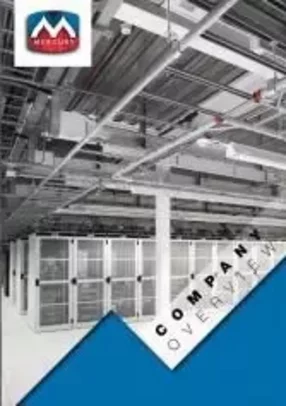Mercury Engineering was founded in 1972 by the late Frank O’Kane and Joe Morgan and over the past 42 years has grown into one of Europe’s largest independent engineering contractors. The company has completed projects in 25 countries on four continents and has annual revenues that exceed €500 million. Since its inception, the company has focused on three core values - safety, innovation and quality - and these principles guide the company today as they work with an ever expanding client base throughout the world.
The key to every successful business is its staff and Mercury has always appreciated and valued its employees. The majority of its highly experienced team are long term direct employees who manage projects on behalf of its clients to the strictest codes of integrity and professionalism.
Over the years, Mercury has grown organically to become a leading international multiservice contractor specialising in HVAC, Process, Electrical, I&C, Data & Telecoms and Fire Protection Installations. The company also provides Project management, Design, Procurement, General contracting, Specialist Commissioning and Maintenance for specific clients and projects.
Innovation and creativity at its core
As a company, Mercury quickly adapts the latest building systems and services both through experience and the use of educational seminars. The company has extensive experience in modular construction, pods, prefabricated piping sections (design & build), IP controlled building management systems, energy management systems and geothermal.
Mercury has invested heavily in the use of Building Information Modelling (BIM) and now employs over 120 80 BIM modellers. Using this technology the company can reduce waste both in terms of time and materials which ultimately improves project delivery times and reduces project costs. Since day one Mercury has been committed to delivering state-of-the-art technology solutions to its clients and will always be one step ahead of the competition when it comes to innovation.
In the construction industry, change is no longer an event; change is business as usual. Mercury believes that adaptability and innovation are keys to positive change. Clients are demanding, "better, faster, cheaper" and competition is fierce. Globalisation, turbulent economies and fast evolving technologies further increase the pressures to "do more with less."
The company’s future success is dependent on keeping the work force educated and equipped with the best tools and business processes.
A culture of change
“It’s a fact that rapidly evolving and pervasive technologies are impacting almost every aspect of the construction business and there's no doubt that these technologies have turned the way we work and communicate on its head. Information technology has opened up previously unimaginable possibilities has given us new tools to manage our business more efficiently and increase the level of service we offer to our clients,” says Ed McIntyre, Director UK .
Mercury’s commitment to fostering a high-tech working environment is demonstrated through the company’s use of the most up to date hardware and software coupled with on-going training and support to all of their staff. The use of evolving technologies is also woven through the company’s future business plans.
“Optimisation has always been a driving force in Mercury’s business. Every project the company undertakes is unique and has its own set of risks and challenges; however the company’s approach is the same; to optimize the engineering design, supply chain, installation techniques and management practices,” says McIntyre. In order to achieve this, the company puts a large emphasis on people and the culture of the business.
With a long and varied history, Mercury has experiences good and bad economic climates yet has managed to keep its head above water thanks largely to its commitment to technology and innovation. As McIntyre explains, “Relentless pressure by clients for continual improvement led the company to invest in and adapt multidisciplinary management, increase use of IT, make use of the most modern materials and to develop more efficient Installation practices. Many of the company’s competitors who didn’t or couldn’t embrace change are no longer here today.”
Management mobility
Mercury began as a local business and has become an International entity. So what made that transition so successful? “A prime challenges faced by the company is to ensure that globalisation becomes a positive force for the business. Mercury began its International expansion programme in 2000 and to date has completed projects in 25 countries on four continents. Undoubtedly, key to this successful expansion was the company’s management mobility, the businesses multinational client base and integrated IT systems,” says McIntyre.
In an increasingly competitive environment, attracting new talent into the company is crucial to the sustainability of the company’s business. Mercury actively recruits new people from a large and diverse set of candidates from across all of areas of operation. The company actively promotes Graduate placement programmes and work with professional institutions endorsing the industry as a career opportunity for school leavers.
Increasing globalisation is another factor facing us all - it is inevitable and irreversible. 2013 was the year that emerging economies accounted for half of the world’s GDP. The mobility of the world’s major manufacturers and the opportunities created around them presents business opportunities to those prepared to adapt quickly.
Looking to the future
“Mercury aspires to be the most successful multidisciplinary engineering contractor in every sector and geographical area in which they operate. The management are committed to investing in the company’s future and to supporting their client’s projects across Europe,” concludes McIntyre.

